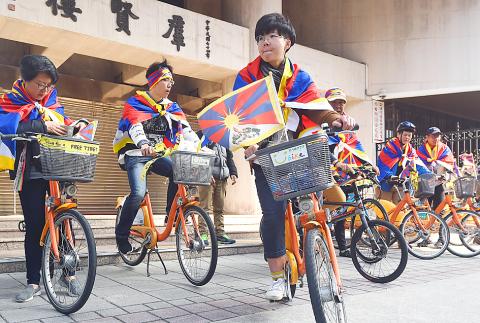Advocates flying Tibetan flags yesterday biked around Taipei to raise awareness for human rights issues in Tibet ahead of the annual Tibetan Uprising Day march.
Although the 1951 Seventeen-Point Agreement for the Peaceful Liberation of Tibet promised religious freedom and autonomy for Tibetans, neither has been realized under the People’s Republic of China government, Cycling for a Free Tibet founder Tashi Tsering told a news conference outside the Legislative Yuan.
“More than 160 Tibetans have self-immolated in protest, the Dalai Lama is still in exile and the 11th Panchen Lama remains missing after being abducted at age six and replaced with a fake,” the Indian-born Tibetan-Taiwanese said.

Photo: Liao Chen-huei, Taipei Times
The agreement was a “one country, two systems” arrangement, Tashi said, adding that “we absolutely cannot accept the way the arrangement turned out.”
Tibet’s experience could be of value to Taiwan, as Beijing has threatened to annex the nation under a similar arrangement, he said.
“Taiwan must look at what happened in Tibet before negotiating with China. We would not trust them at all,” Tashi said.
To raise awareness for human rights issues in Tibet, civic groups have planned nine cycling trips in Taipei, Taichung and Kaohsiung, as well as a march on March 10 to mark the 60th anniversary of the Tibetan uprising against China, Human Rights Network for Tibet director Lin Hsin-yi (林欣怡) said.
Yesterday’s event was the first cycling trip.
The group, which consists of a dozen people from the network, the Taiwan Association for Human Rights and other non-governmental organizations, set off from 228 Memorial Park at 9:30am.
After the news conference, they cycled to the Kelti Building, which houses Chinese representative offices, before heading to Taipei 101.
Worried that increased pressure from Beijing could discourage people from joining the annual march, civic groups have decided to promote the events earlier than usual this year, Lin said.
Last year’s referendums and local elections saw political forces that backed China’s authoritarianism and conservatism win public support by stressing the need to improve the economy, New Power Party Legislator Freddy Lim (林昶佐) said.
“This has caused many to be concerned about Taiwan’s future, and the march is a great opportunity to show the world that Taiwanese still support freedom and democracy,” he said.
Beijing’s crackdowns on human rights are not limited to Tibet and have become more relentless in the past few years, Democratic Progressive Party Legislator Yu Mei-nu (尤美女) said.
In addition to requiring Tibetans to hang portraits of Mao Zedong (毛澤東) and Chinese President Xi Jinping (習近平) in their homes, the Chinese government has also been closing and tearing down churches, she said.
“We should not think of things happening in Tibet as being far away from us, because the same things could happen here. The results of last year’s referendums suggest that Beijing’s influence is growing in Taiwan,” Yu said, urging people to support human rights by joining the events.
The dates and routes of the cycling trips can be found on the network’s Facebook page.

Chinese Nationalist Party (KMT) Chairman Eric Chu (朱立倫), spokeswoman Yang Chih-yu (楊智伃) and Legislator Hsieh Lung-chieh (謝龍介) would be summoned by police for questioning for leading an illegal assembly on Thursday evening last week, Minister of the Interior Liu Shyh-fang (劉世芳) said today. The three KMT officials led an assembly outside the Taipei City Prosecutors’ Office, a restricted area where public assembly is not allowed, protesting the questioning of several KMT staff and searches of KMT headquarters and offices in a recall petition forgery case. Chu, Yang and Hsieh are all suspected of contravening the Assembly and Parade Act (集會遊行法) by holding

PRAISE: Japanese visitor Takashi Kubota said the Taiwanese temple architecture images showcased in the AI Art Gallery were the most impressive displays he saw Taiwan does not have an official pavilion at the World Expo in Osaka, Japan, because of its diplomatic predicament, but the government-backed Tech World pavilion is drawing interest with its unique recreations of works by Taiwanese artists. The pavilion features an artificial intelligence (AI)-based art gallery showcasing works of famous Taiwanese artists from the Japanese colonial period using innovative technologies. Among its main simulated displays are Eastern gouache paintings by Chen Chin (陳進), Lin Yu-shan (林玉山) and Kuo Hsueh-hu (郭雪湖), who were the three young Taiwanese painters selected for the East Asian Painting exhibition in 1927. Gouache is a water-based

Taiwan would welcome the return of Honduras as a diplomatic ally if its next president decides to make such a move, Minister of Foreign Affairs Lin Chia-lung (林佳龍) said yesterday. “Of course, we would welcome Honduras if they want to restore diplomatic ties with Taiwan after their elections,” Lin said at a meeting of the legislature’s Foreign Affairs and National Defense Committee, when asked to comment on statements made by two of the three Honduran presidential candidates during the presidential campaign in the Central American country. Taiwan is paying close attention to the region as a whole in the wake of a

OFF-TARGET: More than 30,000 participants were expected to take part in the Games next month, but only 6,550 foreign and 19,400 Taiwanese athletes have registered Taipei city councilors yesterday blasted the organizers of next month’s World Masters Games over sudden timetable and venue changes, which they said have caused thousands of participants to back out of the international sporting event, among other organizational issues. They also cited visa delays and political interference by China as reasons many foreign athletes are requesting refunds for the event, to be held from May 17 to 30. Jointly organized by the Taipei and New Taipei City governments, the games have been rocked by numerous controversies since preparations began in 2020. Taipei City Councilor Lin Yen-feng (林延鳳) said yesterday that new measures by